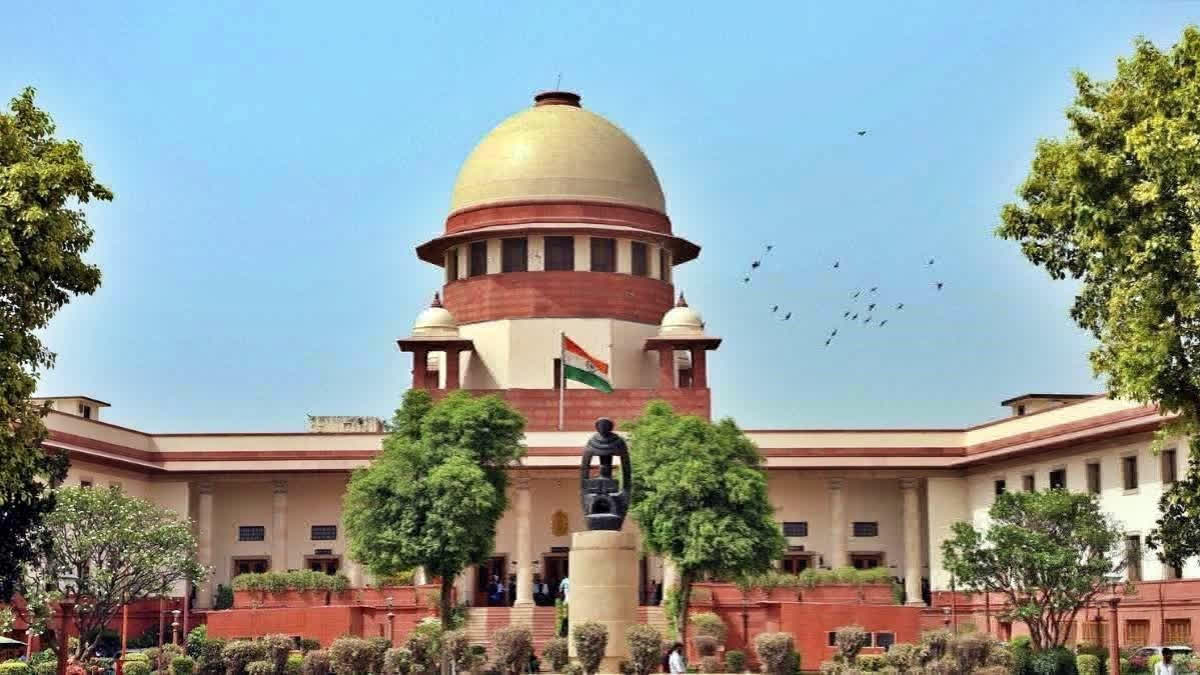New Delhi: The Supreme Court has said that as a Constitutional court, it is entrusted with the duty of upholding fundamental rights guaranteed under the Constitution and when there is identical evidence of eyewitnesses against two accused by ascribing them the same role, the court cannot convict one accused and acquit the other.
The apex court made these observations while acquitting four persons convicted under several sections of IPC, including dacoity with murder and also being part of an unlawful assembly.
A bench comprising Justices Abhay S Oka and Sanjay Karol said: “When there is similar or identical evidence of eyewitnesses against two accused by ascribing them the same or similar role, the court cannot convict one accused and acquit the other." The bench stressed that in such a case, the cases of both the accused will be governed by the principle of parity.
"This principle means that the criminal court should decide like cases alike, and in such cases, the court cannot make a distinction between the two accused, which will amount to discrimination”, said Justice Oka, who authored the judgment on behalf of the bench. The top court delivered the judgment on September 13.
Javed Shaukat Ali Qureshi, accused number 6, had filed an appeal in the apex court challenging the Gujarat High Court order. Initially, a total of 13 accused were prosecuted and seven were convicted by the trial court. The maximum sentence imposed was life imprisonment for the offence punishable under Section 396 read with 149 of the Indian Penal Code (IPC). The High Court confirmed their conviction but brought down the sentence to 10 years.
Three accused preferred criminal appeal in 2016 before the apex court and on August 9, 2018, they were acquitted. In 2018, the apex court summarily dismissed a special leave petition seeking relief by accused number 2 in May 2018, and accused number 3 and 4, did not prefer any appeal challenging the High Court judgment.
Advocate Shoeb Alam, appointed as amicus curiae to espouse the cause of the appellant (Qureshi), submitted that only one witness identified the appellant and ascribed him the role of pulling her gold chain. He said the witness did not know the appellant, therefore her identification of the appellant in the court becomes doubtful as even according to her version; there were 50--100 persons in the mob which surrounded the autorickshaw by which the witness was travelling. It was submitted before the court that the witness also deposed before the court approximately two years after the occurrence of the crime.
The bench noted that accused nos.2 (Amjadkhan Nasirkhan Pathan), 3 (Mehboobkhan Allarakha) and 4 (Saidkhan @ Anna Ikbalhusain), were claimed to be part of the mob but no overt act was ascribed to them. Two police constables, who were witnesses in the case, identified accused number 2, however accused number 3 and 4, were identified by one of these witnesses. The bench said this court earlier did not partially reject the testimony of police constables but rejected their testimony in its entirety.
The bench said assuming that witnesses identified accused nos.2, 3 and 4 by stating that they were members of the mob but once a coordinate bench of this “court discards their testimony in its entirety being unreliable, the benefit of the said finding will have to be extended to the accused nos.2,3 and 4 as they are similarly placed with accused nos.1,5 and 13”.
The bench said accused number 1, 5, and 13, were initially convicted on testimony of these constables but acquitted by holding that the testimony of both witnesses was unreliable and deserved to be discarded.
The bench said: “If the same relief is not extended to accused nos. 3 and 4 (who did not challenge the judgment of the high court) by reason of parity, it will amount to the violation of fundamental rights guaranteed to accused nos. 3 and 4 by Article 21 of the Constitution……. In this case, the suo motu exercise of powers under Article 136 is warranted as it is a question of the liberty of the said two accused guaranteed by Article 21 of the Constitution”. The bench said accused no.2 also must get the benefit of parity.
The bench said: “If we fail to grant relief to accused no 2, the rights guaranteed to accused no. 2 under Article 21 of the Constitution of India will be violated. It will amount to doing manifest injustice”.
The top court said in fact, as a constitutional court entrusted with the duty of upholding fundamental rights guaranteed under the Constitution, it is our duty and obligation to extend the same relief to accused no.2. “Therefore, we will have to recall the order passed in the special leave petition filed by accused no.2”, said the bench.
The top court acquitted Qureshi by setting aside the judgment of the trial court dated 17th March 2006 and the judgment of the High Court dated 11th February 2016 and also acquitted accused number 2, 3, and 4.
According to the prosecution on November 7, 2003, at around 9.00-11.00 AM, a mob of 1000-1500 people formed an unlawful assembly with the common object of attacking people from another community and causing damage to their life and property. The prosecution claimed that the petitioner being a member of the rioting mob, snatched a gold chain off the neck of the witness and that, furthermore the petitioner along with other accused no5 was involved in the recovery of a scooter from a dirty pond. Qureshi was arrested on November 9, 2003.
Also read: 'It is a historic day’, says CJI as SC data now available on National Judicial Data Grid


